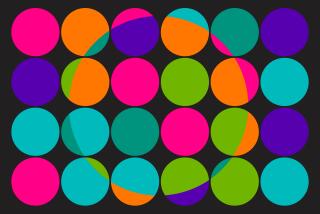Renewed Hope for a Way Out of Depression
- Share via
On the outside, Kaye’s life was so bright and promising that the darkness inside seemed even more unbearable in contrast.
“Why should I feel this way if everything in my life is going so well?” she asked her doctor.
Depression takes its hostages no matter the external environment, and though researchers can’t pinpoint a chemical imbalance, there’s enough evidence from modern science to say it truly is a matter of biology--a brain disease, as psychiatrists refer to it.
Today, there are 19 antidepressant medicines for seven various brain mechanisms--an all-out assault on one of the most insidious mental conditions of our time. There are also several psychotherapies that can turn the hopeless, tearful, apathetic feelings--and the behavior they drive--into more positive perceptions.
If psychiatric studies are correct, 20% of people will experience a major depression. Each year, 8% of people will feel so bad that they probably would benefit from treatment. Unfortunately, the same studies that suggested such high rates of depression also found that only half of these people ever seek help. What’s more, only half of these people will get adequate treatment.
And while researchers are convinced that biochemical abnormalities are at the core of depression--brain scans and substances identified in blood show differences--environmental factors such as relationships most certainly feed the condition. The primary symptoms of major depression include sadness, loss of interest, low energy, anxiety, loss of appetite, loss of libido and irritability.
*
While medicines and psychotherapy have proved beneficial for about 70% of patients who get adequate treatment, the timing of the treatment is critical. The longer the disease settles in the brain, the harder it may be to treat, doctors say. And at present, medicines can take anywhere from two to four weeks to work. This is a major roadblock considering this is when patients are most vulnerable. Fifteen percent of patients kill themselves for lack of treatment or effective therapy.
Scientists have been trying to develop more powerful, fast-acting antidepressants, which could ultimately change the face of mental illness.
If you have symptoms of depression, experts advise an immediate consultation to rule out conditions such as hypothyroidism, anemia and post-viral syndromes.
Depression can also involve mood swings. Lithium is the oldest treatment, but a slew of new drugs, traditionally used to treat epilepsy, has now been approved in controlling mood swings.
It is not clear how long patients require therapy. Studies show that maintenance doses (of drugs or psychotherapy) reduce the chance of another episode, but some people don’t want to stay on medicines indefinitely. Dr. James Kocsis, a professor of psychiatry at the Wiel Medical College of Cornell University in Ithaca, N.Y., generally advises halting antidepressants a year after symptoms subside but to get help quickly if they return.
*
There are many effective treatments for depression. All the medicines seem to work on brain chemicals that regulate mood and behavior. The two main brain chemicals are serotonin and norepinephrine. Newer studies are focusing on medicines that block another brain chemical called substance P. They should be available by the end of the year. Also, medicines will soon be available that focus on a hormone called corticotrophin releasing factor, or CRF, that regulates the body’s stress system.
St. John’s wort herbal supplements also have received a lot of attention for their antidepressant effects. And there is evidence the new herbal called SAM-e is also effective. Doctors recommend that people tell their doctors they are taking these supplements.
Doctors have long been seeking new medicines, because many older antidepressants had many bothersome side effects--constipation, weight gain and sexual dysfunction (Related story, S3). Newer, so-called serotonin-reuptake inhibitors like Prozac and Zoloft have less troublesome side effects, but loss of libido is still a problem.
Shock therapy is an option for severe depression. A painless procedure using magnetic energy over brain areas that regulate mood has also proven beneficial, as have cognitive and psychodynamic therapies, which work on changing behavior and thought patterns.
Are there ways to prevent depression? Dr. Robert Hirschfeld of the University of Texas Health Science Center in Galveston recommends exercising to reduce stress and maintaining ties with family and friends.






